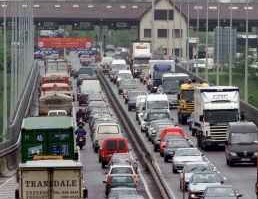Commuters unite
October 4 was another national day of striking in France and one thing is for sure: strikes are not what they used to be. The French government is finally setting the machinery of slow, arduous social reform in motion in an effort to lift the country out of the mire and today was supposed to be the day that all of France stood up and said Non. But they didn't this time, certainly not unanimously.
In the past the whole country would grind to a halt. No one could get anywhere, do anything. Millions of people would try walking to work, but roads were log-jammed, and the government would give in.
Ireland is a calmer place, I hear you say, with good industrial relations bolstering the Celtic Tiger's success. Well, according to the Federation of European Employers (www.fedee.com), France lost about 27 working days per 1,000 employees to strike action in 2004. Ireland lost 54.
Moreover, French strikes are like street carnivals, fun to watch and be in. They are run by well-organised terrier-like unions, such as the communist CGT. The French aim their anger at government as much as at the boss. Ireland's workers focus on picketing the factory gates.
This time the Paris metro seemed to escape the strike, thanks to a "minimum service" agreement with the unions. The suburban and intercity rail services were affected though, as were Marseille, Grenoble and elsewhere. But the capital is where power struggles must be played out; the unions claim 150,000 turned out here, the police say 30. Hardly enough to force ministers into retreat.
How ironic that the renowned Paris metro, once an emblem of worker power, should now be left alone by the strikers.
The century-old system is still a flagship of French transport prowess. Dublin could do with one, I was told again recently as we sat in a traffic jam on the M50 motorway. I replied, if the metro really works so well, how come so many Parisians drive their cars, or like me, ride their bicycles above the madding crowds below? Also, when the roads and metro systems are jammed, they are often jammed all at the same time in Paris. The road system grinds to a halt, with bumpers locking at the crossroads just as noses are being pressed into armpits in the trains and buses, not an inch to spare for a paperback, let alone another train.
Dublin can be frustrating too, despite shiny new buses and the hi-tech LUAS tram. However, as with the DART train along the bay, they do not come often enough, but seem to be rationed out sadistically to shivering commuters. Traffic jams are legion. The transport planners, who should be trying to alleviate traffic rather than create it, seem to get it wrong on the details.
Take the new M50 motorway that sweeps around Dublin in a long, westerly arch. This state-of-the-art asphalt may be without potholes, yet has pitfalls. Or rather, pit stops, as cars squeeze through the inadequate toll stations along the way. The result?
Tailbacks, like the one we were caught in on the way to catch our flight, on a Sunday! The rather less busy A16, Paris's latest motorway, has more gates and a wider approach, while the toll station on the busy A6 must be half a mile wide. Motorists grin and bear the skin-tight Dublin version, though may well fumigate at this planning "own goal". Yet the motorists continue to pay for it.
Perhaps what they need to do is, well, go on strike.
©RJDoyle

|
Tight fit: M50 takes its toll. Photo courtesy www.unison.ie |
